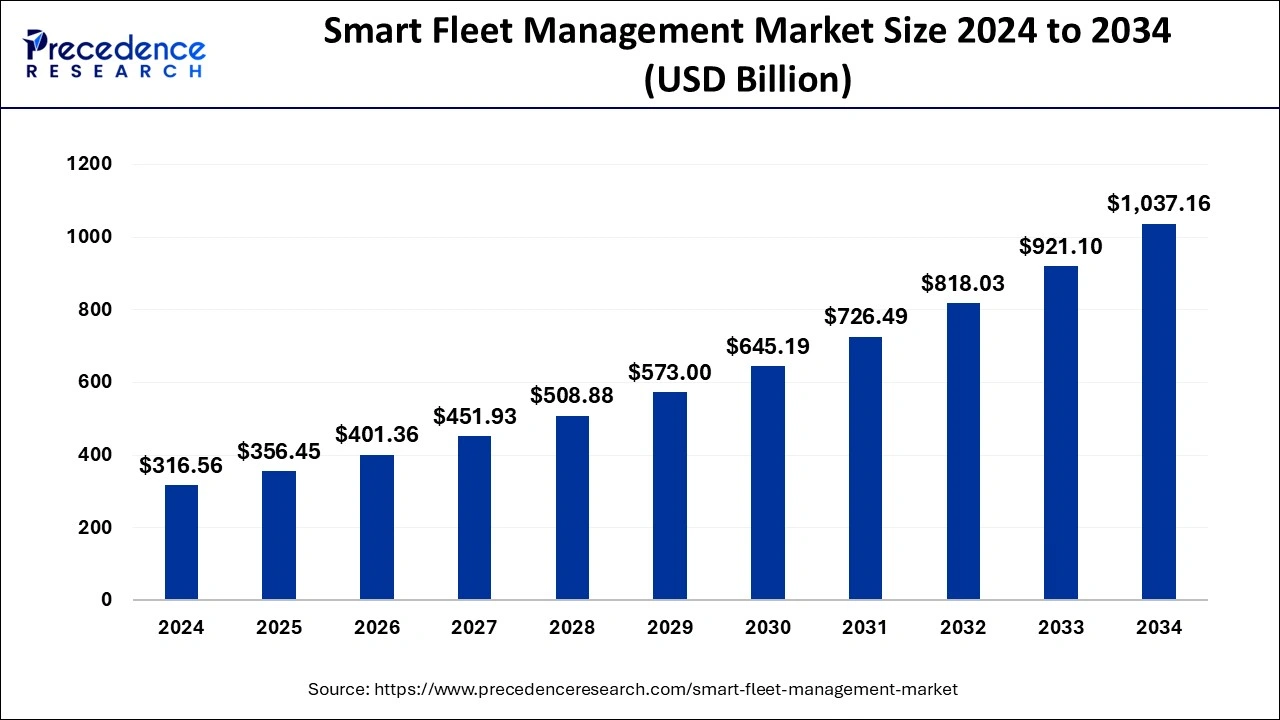The smart fleet management market is projected to grow from USD 316.56 billion in 2024 to USD 1,037.16 billion by 2034, at a CAGR of 12.6%

- Asia Pacific dominated the smart fleet management market with a 40% share in 2024.
- The automotive segment held the largest market share in the transportation category in 2024.
- The Advanced Driver Assistance System (ADAS) segment is projected to grow at a notable CAGR during the forecast period
Market Overview
The smart fleet management market is witnessing significant growth due to the increasing integration of IoT, artificial intelligence (AI), and cloud-based solutions in fleet operations. Companies across logistics, transportation, and automotive industries are investing in smart fleet solutions to enhance operational efficiency, reduce costs, and improve safety. The rising adoption of telematics, real-time tracking, and predictive maintenance is transforming traditional fleet management into an intelligent, data-driven ecosystem. Additionally, stringent government regulations on fuel emissions and road safety are pushing businesses to deploy advanced fleet management technologies. The growing demand for electric and autonomous vehicles is further propelling market expansion.
Drivers
One of the key drivers of the smart fleet management market is the increasing need for real-time fleet monitoring and data analytics. Businesses are leveraging IoT sensors and GPS-based tracking systems to optimize route planning, reduce fuel consumption, and enhance driver safety. The implementation of AI-powered predictive maintenance helps fleet operators detect potential vehicle failures before they occur, minimizing downtime and repair costs. Additionally, regulatory mandates for compliance with environmental and safety standards are encouraging fleet operators to adopt smart management solutions. The rising trend of connected vehicles and advancements in 5G technology are also accelerating the adoption of smart fleet management systems.
Opportunities
The market presents significant opportunities with the increasing adoption of electric vehicles (EVs) and autonomous fleet solutions. Companies are exploring smart fleet technologies that optimize battery performance, monitor charging infrastructure, and ensure efficient EV fleet utilization. Additionally, the integration of blockchain technology in fleet management offers secure and transparent tracking of transactions, reducing fraud risks in logistics and transportation. The growing demand for Mobility-as-a-Service (MaaS) and shared transportation solutions is also opening new avenues for smart fleet management providers. As businesses focus on reducing carbon footprints, sustainable fleet management solutions are gaining traction.
Challenges
Despite its promising growth, the smart fleet management market faces several challenges. High implementation costs and concerns regarding data security and privacy are major barriers to widespread adoption. Many fleet operators, particularly small and medium-sized enterprises (SMEs), hesitate to invest in smart management solutions due to budget constraints. Additionally, integrating smart fleet technologies with existing legacy systems can be complex and time-consuming. Cybersecurity threats also pose a significant risk, as fleet management systems rely on real-time data sharing across multiple platforms. Furthermore, global supply chain disruptions and semiconductor shortages are impacting the availability of connected fleet management devices.
Regional Insights
North America dominates the smart fleet management market due to the strong presence of key technology providers and high adoption of IoT and AI-driven fleet solutions. The U.S. and Canada are investing in smart transportation infrastructure and regulatory frameworks that support fleet digitalization. Europe is also a significant market, driven by strict emissions regulations and increasing adoption of electric and autonomous fleets. The Asia-Pacific region is experiencing rapid growth, particularly in countries like China, India, and Japan, where the booming e-commerce industry is fueling demand for efficient fleet management. The Middle East and Latin America are emerging markets with growing investments in logistics and transportation technologies.
Recent News
The smart fleet management market has witnessed several notable developments, with companies launching AI-based fleet monitoring systems to improve operational efficiency. Leading manufacturers are focusing on integrating 5G technology for faster data transmission and enhanced vehicle connectivity. The increasing deployment of EV fleet management solutions is gaining traction, with several logistics companies partnering with EV manufacturers to develop sustainable fleet operations. Additionally, governments worldwide are introducing new regulations to encourage smart fleet adoption, driving innovation and competition in the industry.
Smart Fleet Management Market Companies
- Continental AG
- Sierra Wireless
- Cisco Systems, Inc.
- Siemens AG
- IBM Corporation
- Tech Mahindra
Segments Covered in the Report
By Hardware
- Remote Diagnostics
- Tracking
- Optimization
- ADAS
By Transportation
- Rolling Stock
- Automotive
- Marine
By Connectivity
- Long Range Communication
- Short Range Communication
- Cloud
By Geography
- North America
- Asia Pacific
- Europe
- Latin America
- Middle East and Africa
Ready for more? Dive into the full experience on our website!
https://www.precedenceresearch.com/